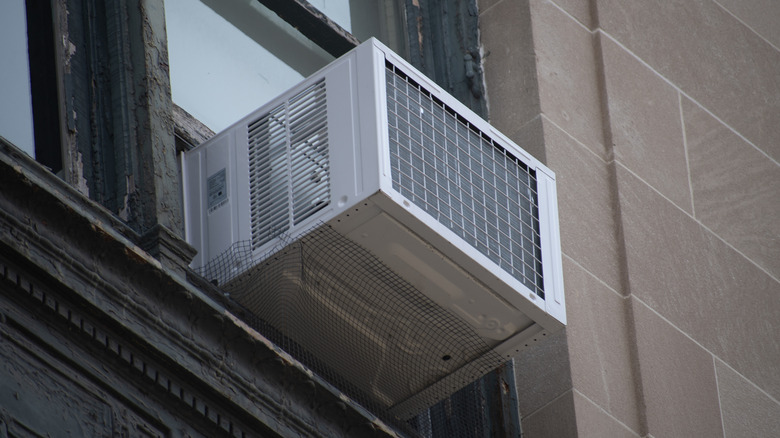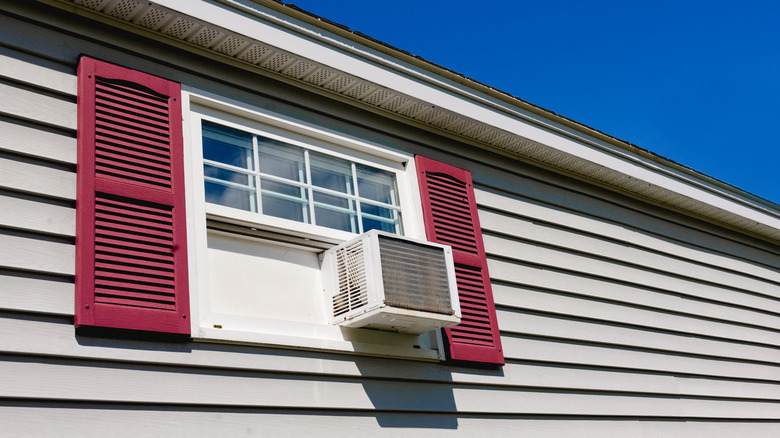How To Clean A Window AC Unit To Prep It For The Summer Season
As global temperatures continue to rise, changing which geographic areas experience heat waves at different times, you'll want to prepare to beat the heat in an economical way (especially as stagnating wages mean it can be even harder to afford home HVAC systems that include central air conditioning). A window AC unit will run you a couple hundred dollars from major retailers like Home Depot or Lowe's, but can ultimately be an invaluable investment. However, chances are good you'll be using your window unit far less during the winter, which means it will be gathering dust — something that can actually reduce the efficiency of a unit's heat exchange, causing it to use more energy while negatively impacting your indoor air quality.
Although window units can withstand snow, sleet, and rain, at a minimum they should be fitted with a cover to prevent excess debris from entering the unit during the off-season. However, it's best to find the right time to remove your window air conditioner altogether for storage during the winter. If you live somewhere that has especially cold winters, you may even want to cover the window unit with insulation like rubber or foam before storing it. While there may not be connected pipes like with a central HVAC system, internal components can still freeze over. Also, no matter how well-kept your storage space may be, you'll want to thoroughly clean your AC unit before setting it up for summer, with particular attention paid to its air filters.
Replacing air filters is integral to cleaning your window AC unit
Air quality can have a major impact on your health, with some estimates suggesting particulate air pollution can cut the average lifespan by about two years. Filters can trap particles, keeping dust, dander, or mold from recirculating throughout your home. It's important to regularly change your filters not just on window AC units, but also other things like your furnace. While you should give everything a deep cleaning before setting your window unit up for the summer, check and possibly replace your air filters regularly while active (six to eight weeks is considered the sweet spot).
The size of your window air conditioner can vary depending on your space, so if you have disposable filters you should consult the manufacturer to know which size will fit your unit. Or, some window AC units have reusable air filters that you can manually wash. Simply turn off your unit and remove the filter before preparing a bath of warm, soapy water – likely best in a sink with a filtering grate over the drain. These filters should be scrubbed gently to prevent any kind of tears or damage, as even reusable air filters should be replaced if experiencing a lot of wear and tear that might affect its efficiency. Once cleaned, the filter should be air dried — again mitigating the risk of ripping the screen by scrubbing it too hard — before being reinstalled in your window unit.
Give the rest of your window AC unit a thorough clean
An air filter isn't all that needs to be cleaned before you can tackle the summer heat. Some parts of your window AC unit can even be cleaned without removing it. For example, the exterior shell can be washed with a hose once the unit is turned off, or you can use a soft-brush vacuum to clear built-up dirt due to clogged filters. If a lot of grime sits along the interior walls or components, hit it with a 1-to-1 degreaser solution mixed with water, or a foaming cleaner. Your unit's evaporator coil should also be replaced once a year, and its drainage tube should be snaked every six months. It's also important to clear areas around your window AC unit. If there are trees outside your window, keep leaves and shrubs cut at least two feet away from the unit so the fans and condenser are free of debris.
However, at the end of the day no one piece of technology is going to last forever — no matter how many filters you clean or broken parts you replace. Eventually you may need to buy a new window AC unit for the summer season. In this case, you're going to want to properly dispose of your old air conditioning unit, which requires specialty removal due to federal laws regarding these units' environmentally damaging refrigerant. You can schedule your unit to be collected by the local Department of Public Works, or any other accredited recyclers.

